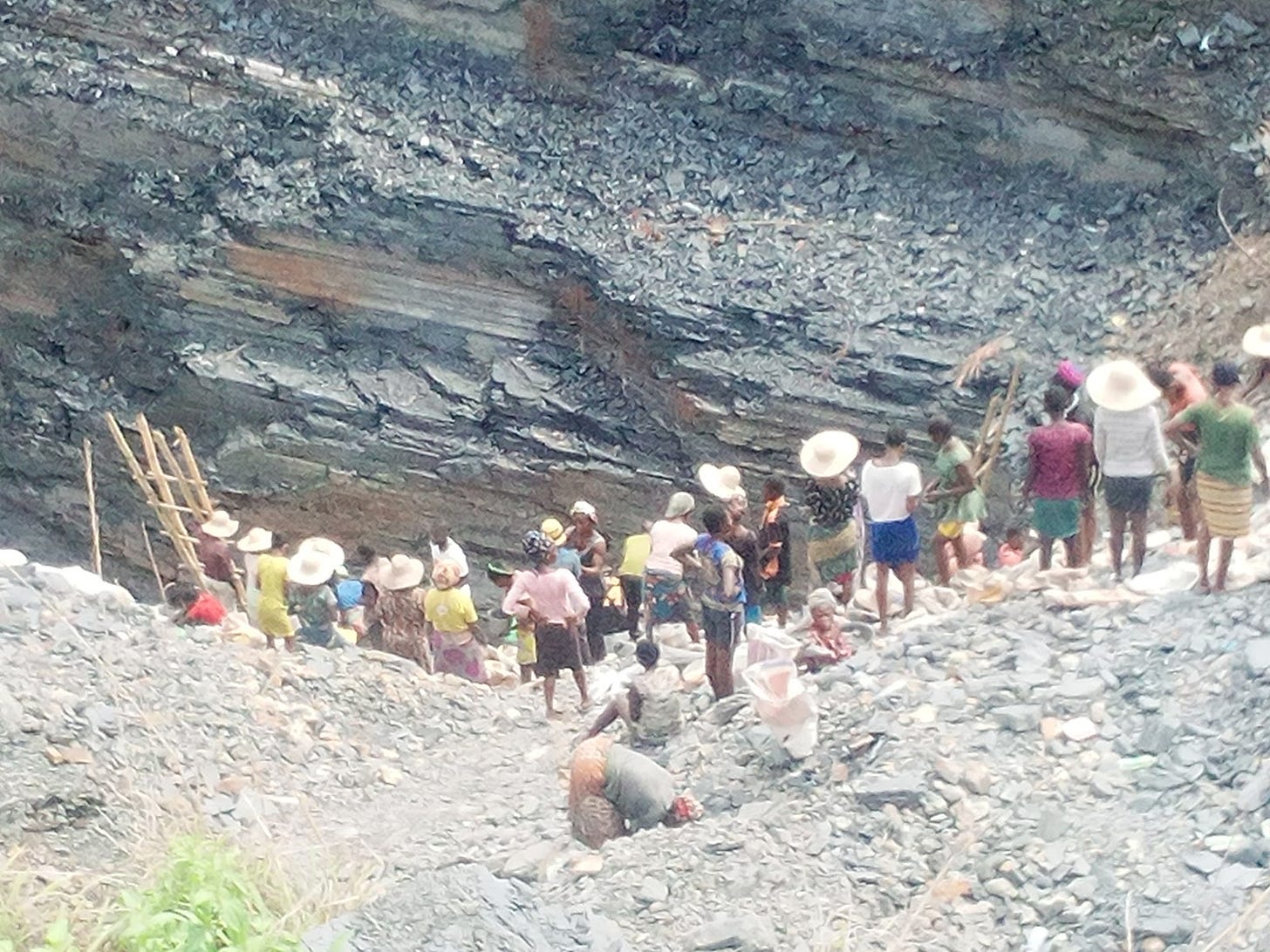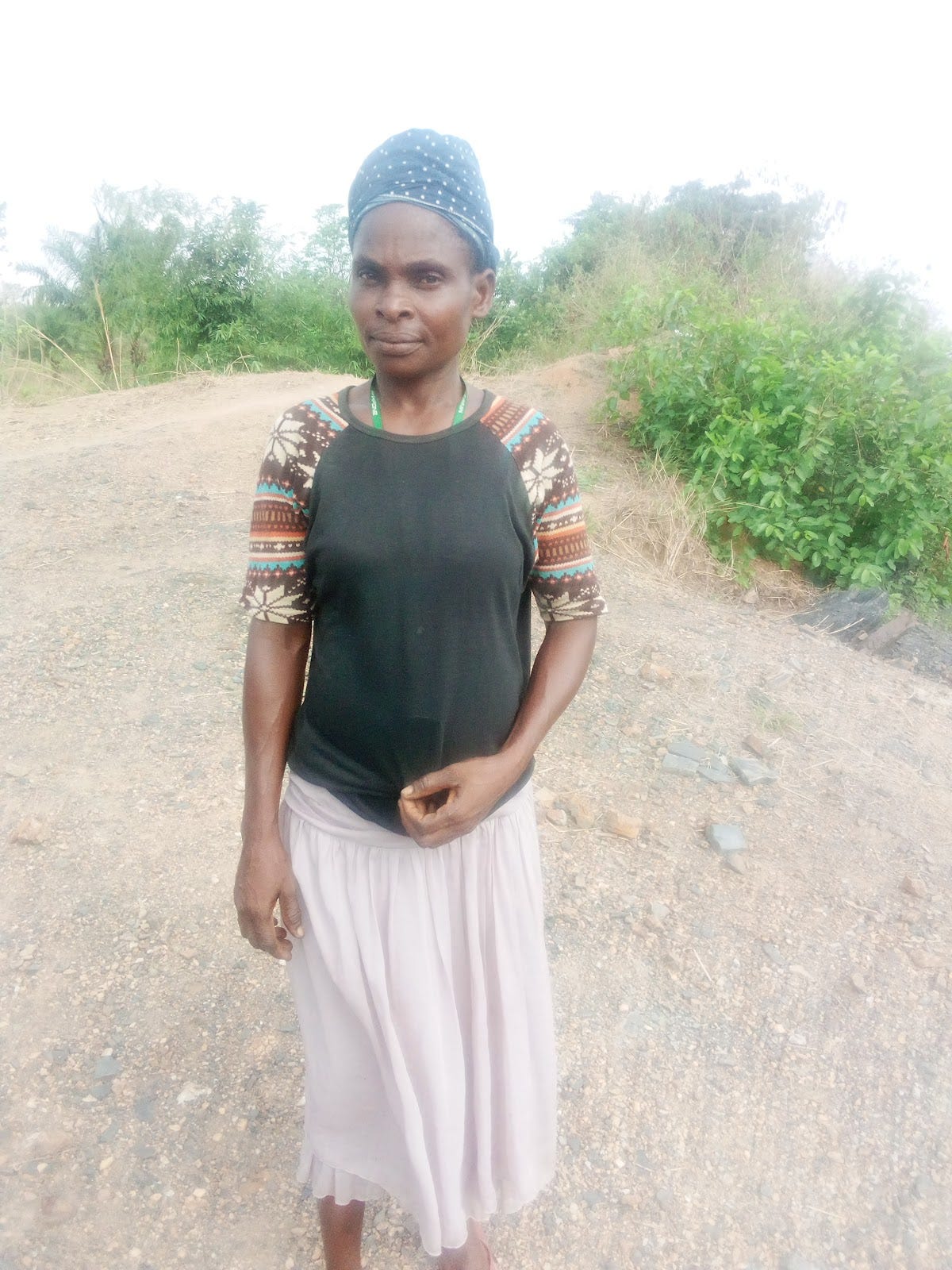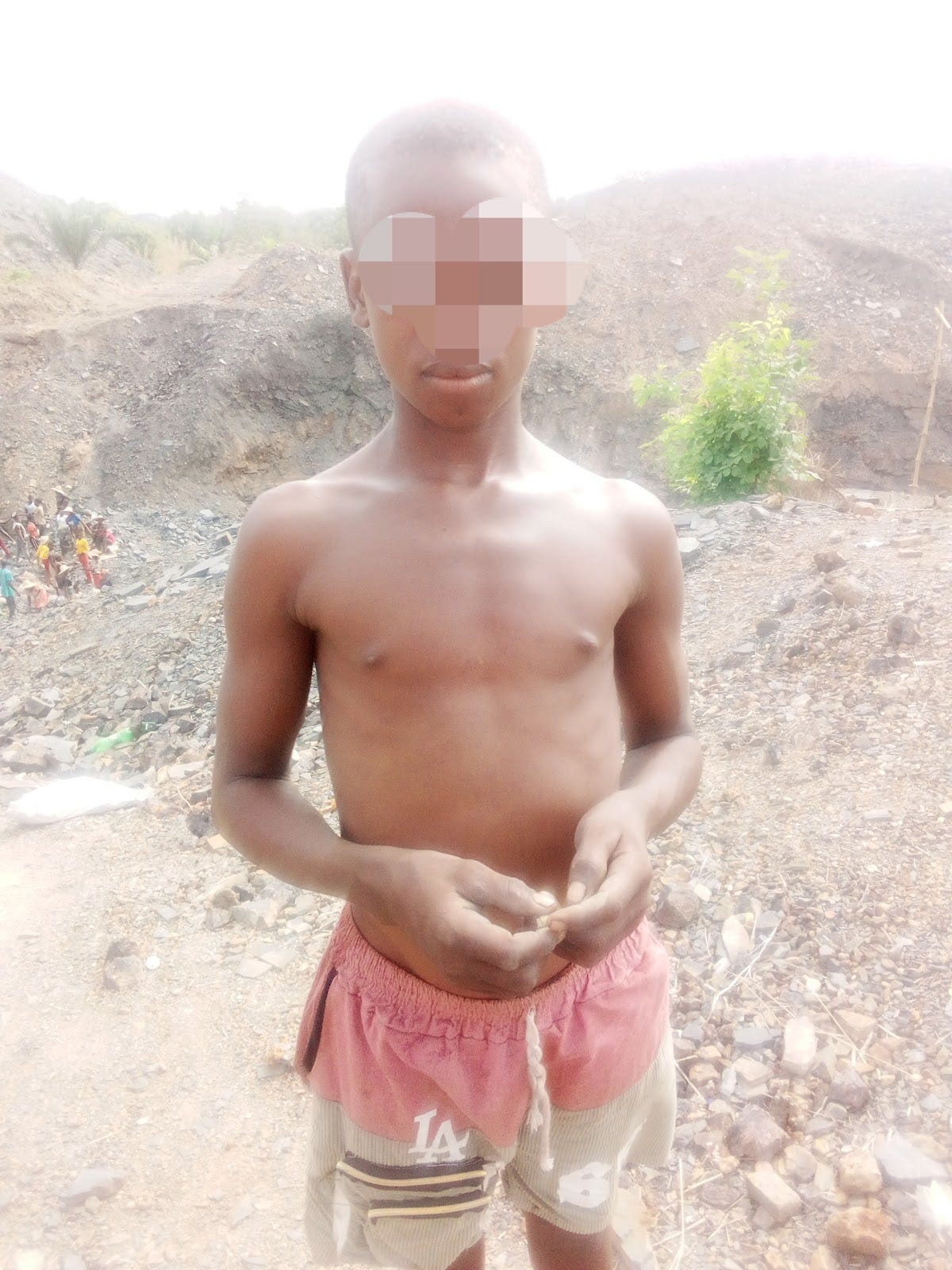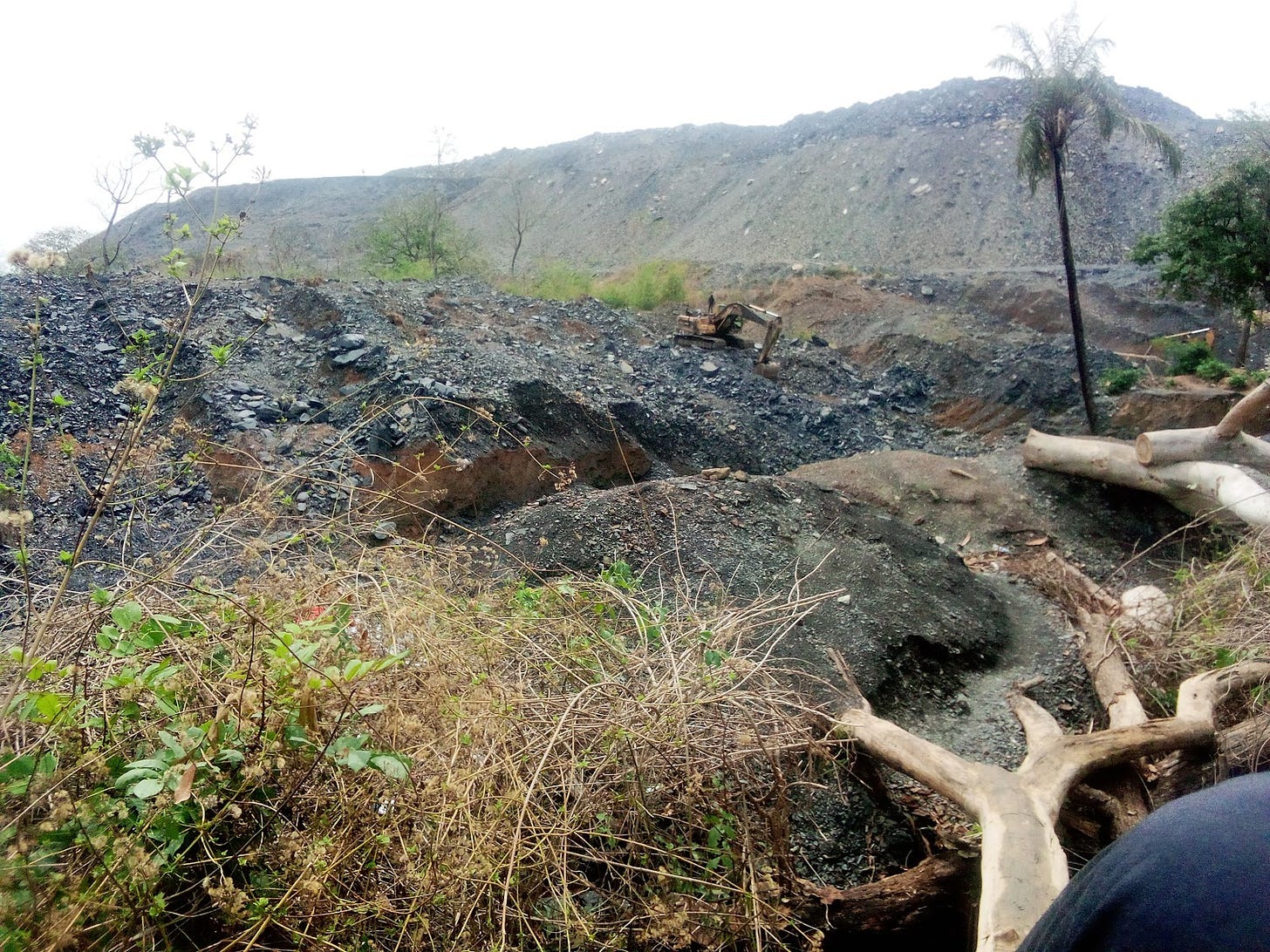
By Wisdom Onwunmelu ― On a sunny Wednesday on April 6 at about 10:30 a.m. some residents of the Enyim Agalagu community in Ebonyi State were seen mining lead and zinc at the Azuogwogo axis. One could hear their voices from about 200 miles away, with the majority being women.
Enyim-Agalagu community is one of the notable communities in the Ebonyi State because it possesses a wide range of solid minerals, such as zinc, lead, galena, and salt. Following the discovery of these natural resources, the state government had in December 2010 entered a memorandum of understanding, with an indigenous mining firm, Royal Salt Company Ltd to carry out mining activities in the community. As part of the signed agreement, the firm was to provide the community with a N1.5 million take-off grant, motorable road networks, and electricity, amongst others.
However, a tip-off received by this reporter about a mining activity ongoing in the community, which is not supervised by the Royal Salt Company Ltd, prompted this inquisitive reporter to journey to one of the most uncommon terrains in Ikwo, LGA, Ebonyi State.
The Pit of Wealth
Solid minerals are usually extracted from great depths in the earth. Some are as deep as 2,000 feet below the soil. While using a shovel to dig up the soil to get these minerals is not feasible, mining experts usually use excavators. The open-cast is usually widened up, and the dugged-out earth is well dispersed to avoid possible caving-in of the pit.
The reporter observed that the artisanal miners found at the Azuogwogo mining site lack the required tools for mining, such as graders, excavators, and dozers. A wooden ladder was found inside the open pit and is being used by the artisanal miners in climbing in and out of the pit to carry out their mining activities.
A closer look inside the mining open-cast shows women and children are more in population at the site. Removal of mined minerals inside the pit was carried out in a chain-like form. Here, the minerals are quickly moved from one person on the chain to another.
Who Controls The Enyim Agalagu Illegal Mining Site?
Elizabeth Nwite, 43, revealed that the mining site is owned by some individuals who control the mining activities
Speaking on the legality status of the mining site, Mrs. Nwite denied knowledge of whether the site is licensed by the government, adding that female miners only earn from profit made from the sales.
“I don’t know if this place is licensed by the government or not.
“As this is a personal land, it is only the men working here that are paid, and the women depend on the amount we get from selling some of the materials,” she said.
Underage children were also seen at the mining site. 17-year-old Lucky, a Junior Secondary School 3 student has been working on the site for more than seven years. He told the reporter that the job is tedious but had to continue because of the meager income he earns.
“They don’t use to pay. But, sometimes, I make N1,000 or N2,000 from selling some of the materials I get here,” he said.
Another 17-year-old teenager, who described herself as Precious, has spent her holidays on the mining site, working daily, and earns between N500 or N1,000 weekly.
Section 21 of the Nigerian Child’s Right Act, 2003 recognises a child as anyone below the age of 18. As regards exploitative child labour, section 28 (3) of the act stipulates a fine of not exceeding N50,000, or imprisonment for a term of five years, or both fine and imprisonment.
To provide a clearer picture of the ownership, leadership, and activities at the mining site, efforts made to reach the leadership of the Enyim-Agalagu Development Union for comments were abortive at the time of filing this report.
Illegal Mining in Nigeria and Risks
According to a report, a total of about 1,759 illegal mining sites were operational in Nigeria, as of 2017. From these 1,759 illegal mining sites, the country is losing between $2 to $3 billion, according to a report credited to the director of the Nigerian Extractive Industry Transparency Initiative (NEITI), Dr. Dieter Bassi in October 2021.
Aside from its impact on the economy of the nation, illegal mining activities could also pose a threat to the health and well-being of its perpetrators, the host communities, and humanity in general. In 2011, about 165 people, including 111 children were reported to have died in Zamfara State, Nigeria, due to alleged Lead poisoning, attributed to illegal mining.
In August 2021 in Ebonyi State, a Volkswagen Golf, conveying the All Progressives Congress (APC) youth leader, Ogochukwu Elem, and two others plunged into one of the artisanal mining pit, dug over 20 years ago along the Abakaliki-Ikwo road. None of the three occupants survived the unfortunate incident. These and many more, are some of the gory tales associated with illegal mining.
A study carried out by the National Institute for Occupational Safety and Health, revealed that miners especially those working without any protective gears, exposed to long-term mining operation could be exposed to respiratory diseases, such as; Pneumoconiosis, and Chronic Obstructive Pulmonary Disease, amongst others.
Engr. Taoheed Hammed, a mining engineer, and consultant with Bryony Nigeria Ltd described mining of Lead and Zinc as dangerous operations..
Mr Hammed explained that lead is a heavy soluble metal that is capable of clogging the blood steam and can result in death, if not quickly and properly handled.
“Some time ago, there was a case of lead poisoning where several communities were reported to have been wiped out,” he recalls.
Speaking further, Hamed said, “Mining such minerals requires top experienced personnel services.
“It is just very painful what Nigerians are subjected to because of the poverty in the land,” he sympathised.
“It should also be noted that illegal mining activities do expose communities and environments to security threats, environmental devastation (erosion, poisoning). Such damages will cost the community and government a fortune to remediate,” Mr Hammed said.
Actions Taken, and Way Forward
The Nigerian Minerals and Mining Act, 2007 section 131 (d) stipulates as an offence the illegal exploration of minerals or quarry operation, section 131 (a) and (b).
To order to protect the country solid minerals from exploitation by illegal miners, the Federal Government in November 2021 inaugurated a 14-member National Labour Committee to draft a framework that would guide mining activities in the country. The committee chaired by the National Security Adviser (NSA) Babagana Monguno, terms of reference is the development of a framework for vetting potential miners who would undertake mining activities in states where mining activities take place.
Following the unfortunate incident involving the Ebonyi State APC youth leader, and two others in August 2021, the state government through the ministry of environment embarked on a rapid clampdown of several illegal mining sites in September 2021. This led to the arrest of about five individuals, according to reports.
Engr. Hammed believes that synergy between individuals, the communities and the government is required for effective countering of illegal mining activities in Nigeria,
“Protecting minerals from illegal miners is everybody’s duty in the country. Every community must report whatever they see to the appropriate authority. Wiith that, activities of illegal miners can be curbed,” he said.
Mr. Stephen Eze, an indigene of Enyim-Agalagu community believes that the artisanal mining site in the community is not licensed by the government, adding that “government does not know about what is going on here, and it is very bad and risky.”
Mr Eze believes that adequate support from the government in the form of loans and employment would go a long way in reducing the rate of illegal mining, “The women and children you see here are just trying their best to survive, government should try and provide money and jobs, so that things like this would stop.”
Efforts made to reach the state government including the Special Assistant to the Governor on solid minerals, Mr. Ozoemena Njoku was abortive as of the time of filing this report.
This report was sponsored by I-79 Media Consults under the ‘Rewriting the Narratives of Environmental Crimes in Nigeria’ project which is supported by the Environmental Reporting Collective (ERC).




